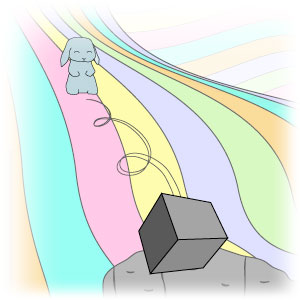 [To read the first part of this article, click here.]
[To read the first part of this article, click here.]
Now that we've seen the true cost of holding on to all this stuff, what next?
The answer is simple: minimize the amount of stuff entering and staying in your life so you can focus on what's important to you.
By ruthlessly removing and evading the unimportant, we create time and energy for what's important.
So how do we accomplish this? Let's start with the incoming stuff…
Stop Needless Obtaining
We want to jump in and start throwing everything in the trash, but before that, we need to restrict the flow of new things into our life. If we don't do this first, there's no point to simplifying because our lives will be just as complex as soon as we've taken in something new.
Of course, some things need to be purchased. There are things required for surviving [food], work [laptop], civility [soap].
But most things aren't necessary. And most things don't contribute to our goals and priorities.
When you are about to buy something, when somebody offers you something, work on turning off your automatic "Sure! Why not?" response. Your default answer should be "no."
If you say yes to a new thing, it had better have a good reason to enter your life. Ask yourself what benefits it will bring you, and see if they stack up to the hassle of bringing this thing into your life.
Throw Away Everything You Can
Now that we've eliminated any extra incoming stuff, look at what you have. How much of it is in boxes? How much inaccessible in a drawer? How much is hidden in your garage?
Set a decluttering goal.
Maybe it's your water-painting hobby. You haven't touched your paints or brushes in three years. Make a goal to remove every single brush, paint, and water-painting paper you have. Throw them away, give them to a friend. You'll have more focus and energy for the hobbies you're actually pursuing right now.
Half a year ago I set a goal to get rid of half of everything I owned. Shortly after, I did it again.
You don't need a huge goal though. It's great to start small. Perhaps you can promise to just clear off one surface. A great thing Gretchen Rubin says: "Outer order contributes to inner calm."
And when setting small goals, realize that decluttering can be addicting. One small goal can inspire a larger one.
A dozen small goals you actually accomplish are better than one huge goal that you give up on when it overwelms you!
Whatever it is, make a goal, big or small. Get rid of stuff. Enjoy the calm!
Maintain The Rest
Whatever you keep, whatever you don't get rid of, stays in your life.
Like I said in part one, stuff that stays in your life, doesn't passively sit there. It takes time, energy, focus away from you. Stuff is not benign.
So make sure that whatever is left is worth that time, energy, and focus, and take care of it!
Taking care of your stuff means treating it well, keeping it clean, keeping it healthy.
Is your camera's battery charged? If your camera isn't charged up, you won't use it, and it can wear out the battery life. If your camera isn't charged, it's dead weight and taking value from your life.
Is your desk clean? Your desk is where you do your work; treat it well. Consolidate your sticky notes, wipe off the surface, throw away the trash.
Are your books organized? If your books are valuable to you, organize them! Right now, mine are disorganized and cluttered. My goal for today is to fix that. If your stuff is disorganized, you won't know where anything is, and you won't be able to use any of it.
No matter how much stuff means to you, if it's disorganized, if it's lost beneath a pile of clutter, if the batteries are discharged, if it's too dirty to wear, if it's not set up with all the power and audio cords plugged in…then it's dead weight.
So stop obtaining, purge, purge, purge, and organize and take care of what you keep, huzzah!
<3
] chloe [

